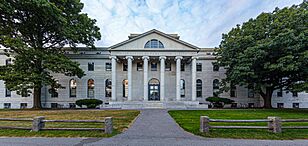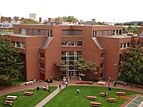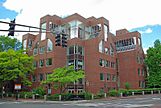Harvard Kennedy School facts for kids
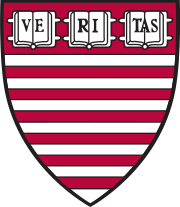
Coat of arms
|
|
| Motto | Ask what you can do |
|---|---|
| Type | Private nonprofit public policy school |
| Established | 1936 |
|
Parent institution
|
Harvard University |
| Endowment | $1.7 billion (2021) |
| Dean | Jeremy M. Weinstein |
|
Academic staff
|
250 |
| Postgraduates | 1,100 |
| Location |
,
,
U.S.
42°22′17″N 71°07′19″W / 42.37139°N 71.12194°W |
| Campus | Urban |
The John F. Kennedy School of Government, also known as Harvard Kennedy School (HKS), is a special school at Harvard University in Cambridge, Massachusetts. It's a public policy school, which means it teaches people how to solve big problems and make good decisions for the public. Students learn about government, politics, and how countries work together.
HKS offers advanced degrees called master's degrees and doctoral degrees (Ph.D.s). The school researches important topics like politics, government, and economics. It is part of a group of top schools from around the world that train future leaders in international affairs.
The school's main campus is in Cambridge, near the Charles River. Its buildings are located on a spot where a train yard used to be. Many famous people have graduated from HKS, including 21 leaders of countries from all over the globe.
Contents
History of the School
How It All Started
The school first opened in 1936 as the Harvard Graduate School of Public Administration. It was started with a $2 million gift from Lucius Littauer, a Harvard graduate and former U.S. Congressman. That money would be worth over $43 million today!
The school's shield, or logo, was inspired by the Great Seal of the United States to show its focus on serving the country. The first teachers came from Harvard's government and economics departments. The first students began their studies in 1937.
Originally, the school was located in the Littauer Center, which is now used by Harvard's Economics Department. In the 1960s, the school started to create the degree programs it is known for today.
A New Name and Campus
In 1966, the school was renamed in honor of John F. Kennedy, the 35th U.S. president, who had graduated from Harvard. This happened three years after he was assassinated.
Around the same time, the Harvard Institute of Politics was created. This institute invites famous speakers and holds events for students. It is housed on the HKS campus in a building with a special forum named after John F. Kennedy Jr..
By 1978, the school had moved to its current campus. The new location brought all of its programs and research centers together in one place.
Growing and Changing
In 2008, the school started calling itself Harvard Kennedy School to make its connection to Harvard University clearer. This change was supported by President Kennedy's family, including his brother, Senator Edward M. Kennedy, and his daughter, Caroline Kennedy.
In 2012, HKS began a major project to expand its campus. The school added new classrooms, a dining hall, offices, and student lounges. The new, larger campus opened in late 2017.
What Students Learn
Types of Degrees
Harvard Kennedy School offers several advanced degrees for students who have already finished college.
- The Master in Public Policy (MPP) is a two-year program. It focuses on skills like analyzing problems, economics, and management for people who want to work in government or for non-profit groups.
- The Master in Public Administration (MPA) has different versions. One is for professionals who have been working for many years. Another is for students who already have another graduate degree. There is also a special two-year program that focuses on helping developing countries grow their economies.
HKS also offers three Ph.D. programs for students who want to become experts and researchers in public policy, social policy, or health policy.
Working with Other Schools
Students at HKS can take classes at other famous schools, like MIT Sloan School of Management and The Fletcher School at Tufts University. They can also earn joint degrees, which means they study at HKS and another school, like Harvard Business School or Harvard Law School, at the same time. This allows them to earn two degrees in less time.
School Rankings
Harvard Kennedy School is often called one of the best public policy schools in the world. U.S. News & World Report has ranked it as the top school for social policy and health policy.
Its programs on international relations are also ranked among the best. A survey in Foreign Policy magazine has consistently placed HKS at or near the top for its graduate programs.
Student Life
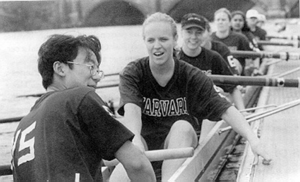
Students at HKS can join many different groups and activities. There are student clubs, a student government (KSSG), and student-run magazines about policy. Students can also play on sports teams.
HKS is home to 14 special research centers. These centers study topics like government, human rights, the media, and international security. They often invite experts to share their knowledge with students.
Famous Graduates
Over 63,000 people have graduated from Harvard Kennedy School. Many have become leaders in government, business, and other fields all over the world.
World Leaders
- Felipe Calderón, former president of Mexico
- Tsakhiagiin Elbegdorj, former president of Mongolia
- Lee Hsien Loong, former prime minister of Singapore
- Tharman Shanmugaratnam, current president of Singapore
- Maia Sandu, current president of Moldova
- Juan Manuel Santos, former president of Colombia and a Nobel Peace Prize winner
- Ellen Johnson Sirleaf, former president of Liberia and a Nobel Peace Prize winner
- Pierre Trudeau, former prime minister of Canada
- Ban Ki-moon, former Secretary-General of the United Nations
- Lawrence Wong, current prime minister of Singapore
U.S. Government Officials
- Dan Crenshaw, U.S. Congressman from Texas
- John Fetterman, U.S. Senator from Pennsylvania
- Pete Hegseth, U.S. Secretary of Defense
- Jack Reed, U.S. Senator from Rhode Island
- Chris Van Hollen, U.S. Senator from Maryland
- Paul Volcker, former chairman of the U.S. Federal Reserve
Other Notable Alumni
- Ashley Judd, actress and activist
- Hill Harper, actor and author
- Bill O'Reilly, political commentator
- Klaus Schwab, founder of the World Economic Forum
- Bryan Stevenson, lawyer, social justice activist, and author of Just Mercy
- Princess Elisabeth, Duchess of Brabant, heir to the throne of Belgium
See also
 In Spanish: Escuela Harvard Kennedy para niños
In Spanish: Escuela Harvard Kennedy para niños
- List of memorials to John F. Kennedy
- Public policy school
 | William M. Jackson |
 | Juan E. Gilbert |
 | Neil deGrasse Tyson |


